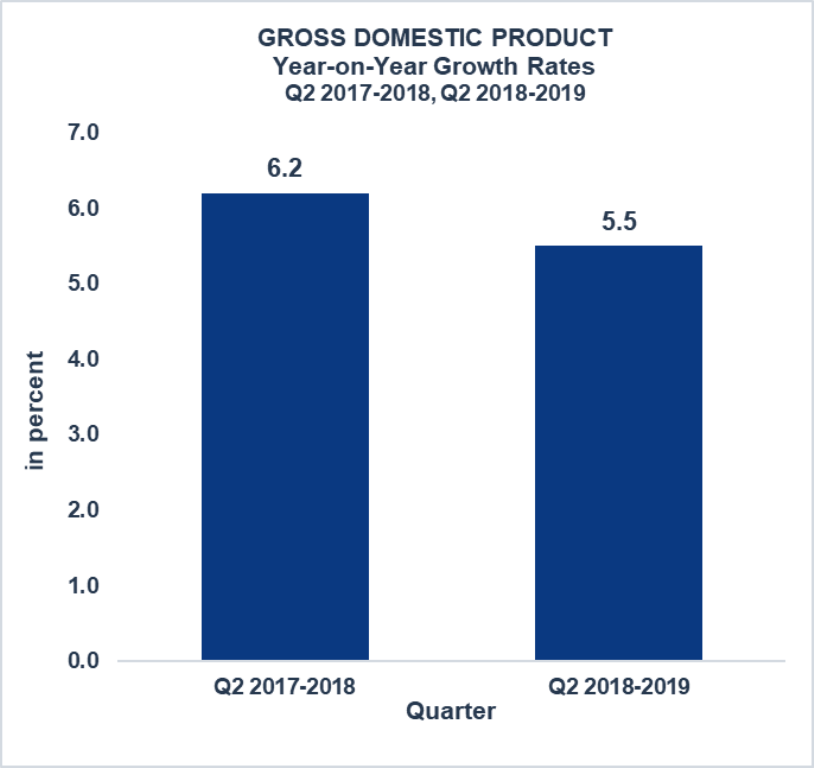PHL economy further slows to 5.5% in Q2

The Philippine economy grew by 5.5% in the second quarter of the year, compared with 5.6% in the first quarter of 2019 and 6.2% in second quarter of 2018,data released by the Philippine Statistics Authority (PSA) on Thursday showed.
It was the slowest in 4 years since the gross domestic product (GDP) expanded by 5.1% in the first quarter of 2015.
“As reported by the Philippine Statistics Authority, the Philippine economy grew 5.5 percent in the second quarter of 2019, the country’s lowest growth outturn in 17 quarters,” said Socioeconomic Planning Secretary Ernesto Pernia
Among the major economic sectors, services grew the fastest at 7.1%. Industry expanded by 3.7%. Agriculture, Hunting, Forestry and Fishing was flat at 0.6 percent, Claire Dennis S. Mapa, national statistician and civil registrar general, said in a separate statement.
Weather disturbances
Pernia noted the El Niño phenomenon as well as the increasing protectionism in advanced economies and the election ban on construction activities earlier this year impacted the economy.
El Niño phenomenon was responsible for the contraction in output of water-sensitive crops such as palay, “which contracted by 5.5 percent, and corn declining by 8.4 percent.”
The agriculture sector must be equipped “with an effective climate change and disaster risk reduction program that will reduce production losses owing to weather disturbances,” Pernia added.
In a press conference in Pasig City, the Cabinet official singled out the delayed passage of the 2019 national budget.
“This weak economic performance during the second quarter of 2019 is the continuing effect of that delay in the passage of the 2019 budget, coupled with the election ban,” he said, citing the ban on all public works in the early this year in the run up to the mid-term elections in May.
Reenacted budget
The economy should have grown by 1 percentage point more during the first and second quarters if not for the reenacted budget in January to March, said Rosemarie Edillon, National Economic and Development Authority (NEDA) undersecretary.
“If we have spent according to fiscal program, then growth would have been at least 1% higher.”
With the supermajority of Duterte allies in Congress, it is unlikely that a reenacted budget will be repeated in 2020, Pernia noted.
“I am sure, I am very sure. I think it’s almost certain that Congress will do a better job at expediting the approval of the 2020 budget,” he said.
“I think they will be embarrassed if that happens again. I just think they will not allow something like that to be repeated,” Pernia added.
In Malacañang, presidential spokesperson Salvador Panelo said the slow growth may only be temporary
“Well, according to our economic managers temporary lang naman iyan eh, gaya ng mga nakaraan, ginagawan natin ng paraan iyon,” he told reporters.
‘Doable’
To boost spending and drive economic growth, Pernia called on concerned government agencies to speed up the approval process required by infrastructure projects under the Build, Build, Build program.
“In terms of processing of projects after NEDA Board approval, I think the process of detailed engineering, procurement clearance from the Department of Environment, they can speed it up if there is political will on the part of the heads of these agencies and cooperation among agencies,” he said.
The Philippine economy will have to grow by 6.4% on average in the second half to achieve the lower end of the 6-7% full-year target.
“Nothing is impossible. If most things are favorable to the economy, then that can be achieved. That’s doable, although it’s an aspiration rather a forecast,” Pernia said. —with Virgil Lopez/VDS/KBK, GMA News




